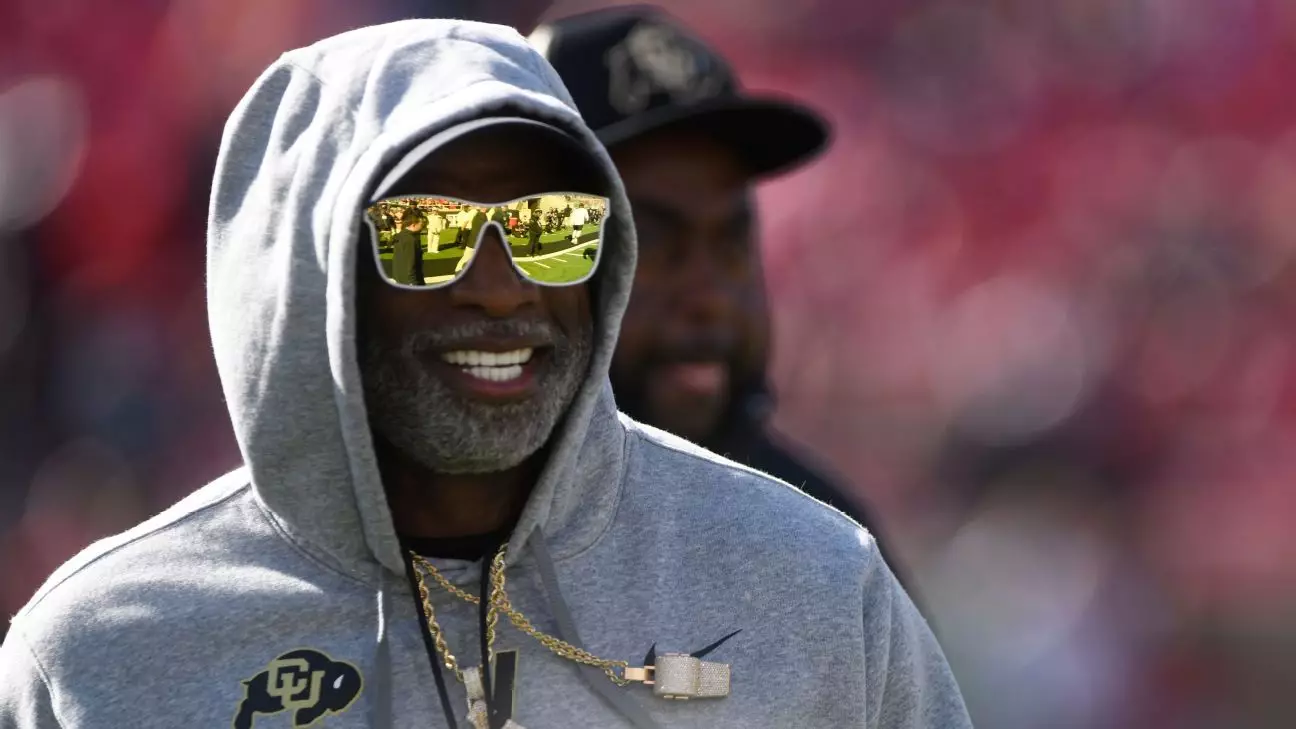In a groundbreaking move that sends ripples through the realm of college sports, Colorado football coach Deion Sanders has locked in a stunning five-year contract extension worth a jaw-dropping $54 million, ensuring his presence on the sidelines until 2029. This decision not only underscores the meteoric rise of Sanders but also reflects a seismic shift in the college football landscape. His base salary will reach $10 million by 2025, firmly positioning him atop the compensation chart in the Big 12 and among the elite coaches nationwide. The staggering figures constitute more than mere numbers—they represent a bold endorsement of the changing tides regarding how the sport values its coaches.
Sanders’ contract stands as a symptom of a broader trend: the commodification of college athletes and the ever-increasing financial stakes involved in their success. Yet the narrative surrounding Sanders isn’t merely about wealth; it embodies a Liberating vision within a primarily controlling institution. Coaches with his charisma and mediagenic talent play a pivotal role in transforming programs into national brands, and nothing exemplifies this better than Sanders’ journey from inheriting a floundering 1-11 Colorado team to garnering national attention and respect.
The 2024 Season: A Benchmark for Change
The fruits of Sanders’s labor are tangible. His first season garnered a historic nine-win record and a bow berth, elevating the Buffaloes from obscurity. Colorado’s football program is now a hotbed of excitement, having attracted over 54 million viewers throughout the 2024 season, igniting fervor not only among fans but also prospective students. The eye-catching numbers associated with their games tie directly into an unprecedented 20% spike in university applications, a salient reminder that success on the field can lead to success off it.
This upward trajectory isn’t merely anecdotal. Notably, applications from Black or African American students soared by an astounding 50.5%, further highlighting Sanders’ unprecedented influence. His presence has not just transformed football tactics; he has begun to shape Colorado’s academic and cultural landscape. This is a coach who understands that the game transcends the gridiron, focusing on personal development and empowering young athletes to thrive in an increasingly complex world.
The Economic Impact: More Than Just Football
The financial implications of Sanders’ leadership extend beyond mere ticket sales and viewer ratings. The Colorado football program generated a staggering direct economic impact of $93.9 million on Boulder’s local economy. This statistic reflects both the importance of a successful football program and the symbiotic relationship between sports and community prosperity. When affiliated with a charismatic leader like Sanders, every touchdown creates ripples of economic benefit, underlining the intrinsic value of a winning program.
Moreover, the excitement surrounding the Buffaloes is not just a flash in the pan. The fact that they sold out nearly all home games last fall signals a revitalization unmatched since the mid-90s. Athletic Director Rick George’s proclamation that Coach Prime has “revolutionized” college football rings with the weight of truth—his influence has stirred a camaraderie between the fan base and the institution, igniting hope and passion.
A Balancing Act: Ambition Meets Responsibility
Yet, the glitz and glamour of Sanders’ contract raise pertinent questions about the nature of college athletics. As we applaud this monumental figure—this electric talent—there’s an unsettling truth lurking beneath the surface: what are the implications of funneling these vast resources into athletic programs while educational funding struggles?
Sanders rightly professes a commitment to developing young men ready to face the world. However, this ambitious message must be balanced with the disproportionate emphasis placed on sports within the academic sphere. It is essential that institutions like Colorado harness this momentum for broader societal benefits, ensuring that the focus on athletic prowess does not eclipse the fundamental purpose of education.
Colorado football’s ascent under Deion Sanders is more than just about touchdowns and tackles; it’s about redefining what can be accomplished when passion meets purpose. As we watch this dynamic saga unfold, one thing remains clear: the narrative surrounding college football is evolving, and it’s high time we engage in a discussion about its implications—not merely for the athletes but for the academic missions these institutions profess to uphold.


Leave a Reply